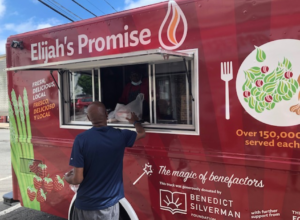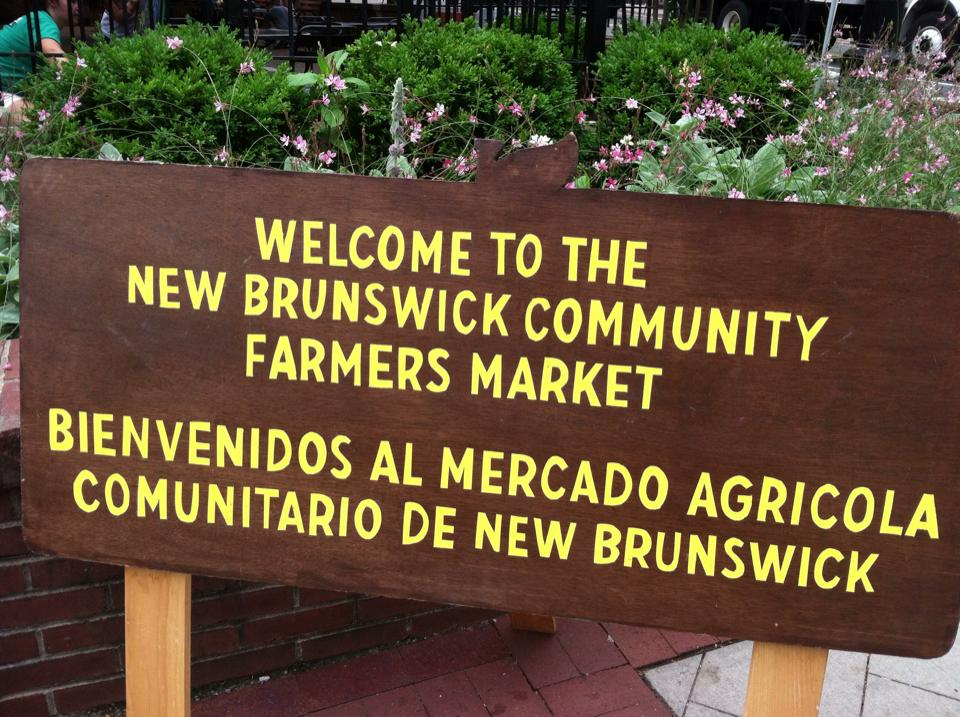

By Caroline Poskrobko
This story was produced in collaboration with NJSpark and the New Jersey Sustainability Reporting Hub as part of the Ecology-Justice Reporting Fellowship.
Nestled along the Raritan River, New Brunswick is home to about 57,000 people. In many ways, it appears to be a booming urban epicenter, with its modern infrastructure, cafes and restaurants enticing passerby with promises of culinary delights, and parks where city-dwellers can bask in the warmth of the sun. In reality, however, about 17 thousand of the city’s near-60 thousand residents live in poverty—more than 30 percent of the population. Food security is a major issue, with many low-income families struggling to access nutritious and affordable food. Advocates say that many residents have to rely on frozen, prepackaged, and fast food as their primary meal sources, which can lead to chronic physical and mental health issues.
In response to this crisis, local nonprofits are teaming up to fight back against food insecurity and provide hope for the community. The organization Elijah’s Promise is one such group—running the city’s Community Soup Kitchen and offering a range of services designed to fight hunger in the city.
With a stated mission to “break the cycle of poverty, alleviate hunger, and change lives,” Elijah’s Promise serves over 350,000 thousand meals per year. At the Community Soup Kitchen, each visitor is served one hot and one bagged meal to go. But the organization has recently expanded its reach; about two years ago, it started the Mobile Meal Program, which delivers more than 2,500 meals per month to people in neighboring communities like Metuchen, East Brunswick, and North Brunswick.
The food truck supports those who cannot get to the brick-and-mortar Soup Kitchen, operating at various locations throughout the week that people can view ahead of time on an online schedule. The food truck typically travels to the parking lots of senior centers, municipal complexes, and places of worship.
Michelle Wilson, Executive Director of Elijah’s Promise, takes pride in the organization’s work and hopes to grow the Mobile Meal Program. “We need to keep looking at new places,” she said. “[The truck] is only two years old so we want to keep extending to new locations to where there is more need.”
Elijah’s Promise also runs a state-certified vocational school and job-training program called the Promise Culinary School. It provides a space for community members seeking employment in the culinary field to gain hands-on experience. Since 1997, the school has achieved a 90 percent job placement rate for its graduates, according to Elijah’s Promise.
Emphasizing the importance of collective action where resources are scarce, Wilson said Elijah’s Promise is supported by individuals, foundations, social service groups, and government agencies.
“We work with everyone,” she said. “That is how we get the work done.”
One of the organization’s closest partners is REPLENISH, a Middlesex County–wide food bank. In 2023 alone, it provided 5.2 million pounds of food to those in need. Wilson states that their support is instrumental in Elijah’s Promise’s work.
Elijah’s Promise also works with the New Brunswick Community Farmers Market, which will open next month on June 15. The market has two locations: one at the NBCFM Market Pavilion (178 Jones Avenue), open Saturdays and Tuesdays from 9:00 a.m. to 1:00 p.m., and another at Kilmer Square Park (108 Albany Street) on Wednesdays from 11:00 a.m. to 3:00 p.m. Customers can buy from vendors that sell fresh, high-quality fruits and vegetables, honey, eggs, and freshly baked goods.
William Hallman, a professor at Rutgers University and one of the founding members of the New Brunswick Community Farmers Market (NBCFM), explained the market began in 2009 to address food insecurity among New Brunswick residents.

A sign post written in English and Spanish welcomes guests to the New Brunswick Community Farmer’s Market.
“We match federal food assistance vouchers, including SNAP, WIC, and Senior Farmers Market Vouchers,” he said. “So if you have $10 in SNAP—formerly known as food stamps—you can walk home with $20 in produce. You can also get rewarded for taking nutrition lessons, getting your blood-pressure checked, and participating in other health screenings while at the NBCFM.”
In addition to the market, Hallman said that the NBCFM has created community gardens at the Jones Avenue location and runs greenhouses across New Brunswick where community members can plant vegetables and raise marigolds for the city’s Day of the Dead celebration in October. The organization also provides produce to Rutgers students and to Meals-on-Wheels, which services older food-insecure New Brunswick residents.
In the face of adversity, local organizations are proving that change does not have to be a pipedream. The key is not only determination, but collaboration. When every avenue is an option, solutions tend to be discovered faster.
“It takes the support of the entire community to make the mission possible,” said Wilson.

Caroline Poskrobko is a senior Honors College student at Rutgers University who is double-majoring in environmental science and journalism and media studies. At Rutgers, she contributes to the university’s environmental magazine RU Green Print.
